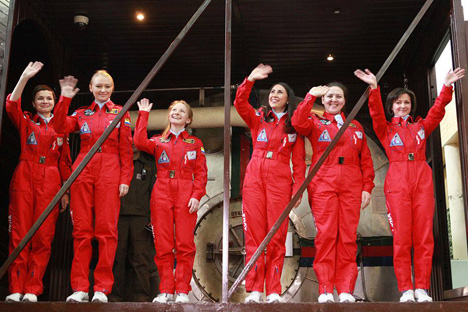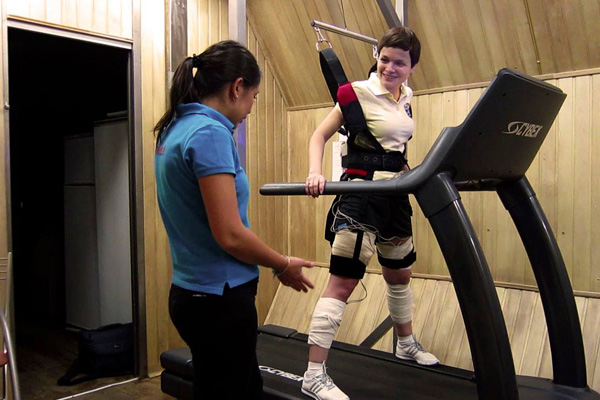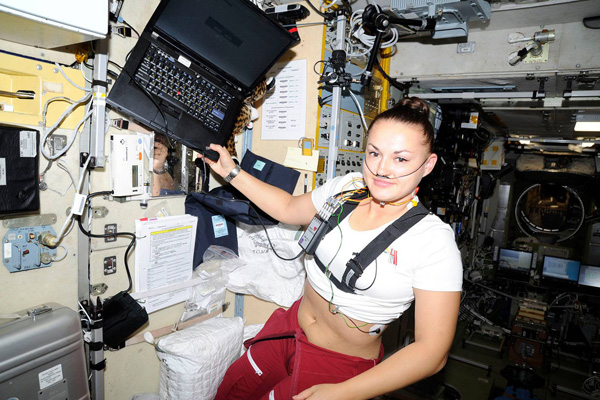
Moon-2015 project.
Press photoSix young women from the Moscow-based Institute of Biomedical Problems at the Russian Academy of Sciences spent nine days and nights in a hermetically sealed capsule completely isolated from the outside world. The experiment was intended to simulate a flight to the Moon. The participants’ log entries would make an engrossing book.
Space beauty: Wipes instead of shampoo
The women described the experiments they were conducting and how hard it was to adapt to life in an isolated capsule. They wrote about their high and narrow beds, unusual food heated in a microwave, limitations on personal hygiene, and lack of contact with the outside world apart from work-related radiograms.
“For me, the hardest thing was not to have any information about my nearest and dearest… Where they are, what they are doing, and what is happening to them,” said project participant, Anna Kussmaul.
“At first, I had difficulty getting a good night’s sleep because the module was not particularly soundproof,'' said Darya Komissarova. ``If the occupant of one cabin was typing in her notebook, the occupant of another heard it all and wondered what she was typing. Also, I have long hair and cleaning it with wipes took ages and was such a pain.”
Landing postponed - storm outside
The conditions in which they had to perform the experiments caused the six women considerable difficulty and discomfort. To record their physiological reactions to the physical hardships, the “astronauts” had to attach electrodes to their bodies and occasionally keep them on for up to 24 hours, which caused skin irritation.
There were two emergencies onboard the capsule during the experiment. First, the women had to give first aid to a fellow crew member who had been electrocuted (the role was performed by a mannequin). As part of that assignment, a real-time telemedicine link was established with a Moscow hospital, where doctors managed the process.
 Moon-2015 project. Source: Press photo
Moon-2015 project. Source: Press photo
Less than 24 hours before the scheduled end of the experiment, participants were told “the landing” was being postponed for 24 hours because of “a storm” at the Vostochny cosmodrome. There were mixed reactions to the news.
“On one hand, we kept saying that we needed an additional 24 hours because the programme was so packed with complex methodologies that there was not enough time to prepare for our return; gather all the equipment, prepare reports, write notes for the instructions, and discuss the exit concept and ‘post-mission’ studies,'' said Elena Luchitskaya, the crew captain. “On the other hand, each of us was already mentally prepared to see our families, thinking that we will be home the next day and will be able to at last take a shower and finally get a good night’s sleep.”
Comparative analysis with men
“It was important to work as a team,'' explained Anna Kussmaul. “When you know that you can share your feelings and emotions, when you know that somebody else is thinking and feeling the same, it is much easier to cope with difficulties. Our crew coped with them well.”
 Moon-2015 project. Source: Press photo
Moon-2015 project. Source: Press photo
As part of the Moon-2015 project, Russian scientists studied mechanisms that a human body uses to adapt to an isolation capsule, tested equipment for the International Space Station, and studied the psychology and physiology of the female body during a long space mission.
During the project, some 30 experiments were conducted, whose findings will be processed by researchers at the Institute of Biomedical Problems over the next several months. Of particular scientific interest is a comprehensive analysis of data --- how the respiratory, cardiovascular, immune and other systems reacted to the isolation capsule.
Scientists will also conduct a comparative analysis of the data received in previous experiments that involved male participants. It is expected that the Moon-2015 project will be the first in a series of space isolation experiments of different durations.
All rights reserved by Rossiyskaya Gazeta.
Subscribe
to our newsletter!
Get the week's best stories straight to your inbox